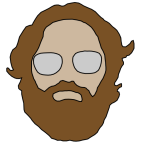
[Previously: Week 1 Review, Day 9]
Yesterday I wrote for 3 hours and 34 minutes.
When an idea keeps showing up in a number of different disciplines, you know there’s something to it. There’s an idea central to the arts that’s also central to the sciences and to nature generally, a process that underlies them all – a “master” process.
Here it is: iterative revision.
What does a writer do? I writer has an idea, writes it down, reads it over. Hmm… something isn’t quite right. The writer flips the pencil around to the eraser end. The writer highlights the text with the cursor. The writer makes some changes, then reads the whole thing over again. Hmm… something isn’t quite right. Lather, Rinse, Repeat.
What does a scientist do? The scientist has an idea for how the world works (in technical jargon, this is a hypothesis), writes down arguments supporting or contradicting this idea (i.e. collects the data), thinks it over (i.e. analyses the data). The scientist then considers whether and how the initial idea of the world is wrong, what additional evidence might challenge the arguments made, what more needs to be determined. Does the idea need to be scrapped? Where is the new explanation incomplete? The scientist refines the idea for how the world works, and here we go again…
What does nature do? Millions of species of creatures on Earth all use different strategies to gather resources, survive, and reproduce. These are Life’s ideas. The environment around these species is continuously changing. Some species do better, some do worse (in technical jargon, this is natural selection). Some new species branch off, some go extinct. And the whole cycle repeats endlessly because the environment doesn’t stop changing.
The two elements – iteration and revision – are simple, and when you look for them around you, you’ll find them absolutely everywhere. Look at what you have, put it to the test, consider it from all angles. Then try to make it better. Now look at it again.
Try because there are no guarantees. Your attempt may make things worse. Your scientific idea might be a poor explanation of reality. It might be wrong. The species might go extinct. Alright – try again.
Better because every little bit helps, and there is no perfect. No story is perfect – the tastes of readers will change, the language will change. Science keeps refining ideas, keeps providing better and more reliable explanations, but our knowledge is never complete. Natural selection produces species that are better fit to their environments, but those environments are always changing.
Emerson, as always, sums it up nicely:
All life is an experiment. The more experiments you make the better.

The Darn Ecologist
